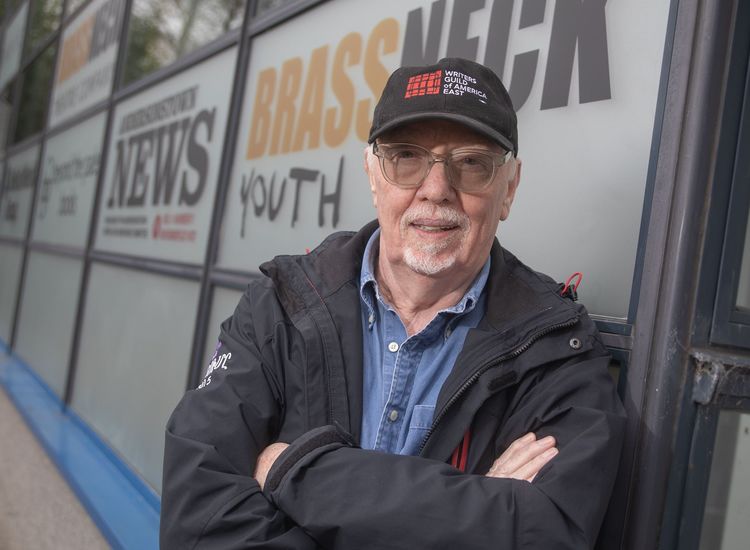Write about what you know, they say. Well, Tom MacDonald at least begins with where he knows. He runs a parish food panty, Harvest on Vine, in his capacity as director of social ministries for St. Mary–St. Catherine of Siena Parish in Charlestown, Mass. And so, in his debut crime novel “The Charlestown Connection” (Oceanview Publishing), the scene is dramatically set with a violent death in a parish food pantry.
Jeepster Hennessy stumbles in and dies at the feet of his godson Dermot Sparhawk, the half-Irish, half-Micmac Indian protagonist who is at the time stocking the shelves. There is a knife in Jeepster’s back.
“Before he dies, he hands Dermot a key with the name McSweeney written on it,” the author said. “and he utters one word: ‘Oswego.’ Dermot is compelled to solve the murder, but as the story unfolds, clues to an unsolved Boston crime from two decades earlier bubble up. Dermot, almost unknowingly, is on track to solve both the murder and the old crime.”
What is your writing routine? Are there ideal conditions?
I write notes on index cards––a word, or phrase, or piece of dialog I hear during the day––and attempt to cobble a scene from the notes. Other times a scene comes to me and I look for words, phrases, and dialog to fill it in. Finding ideas is the fun part, writing it is the tough part. There isn't a sentence in “The Charlestown Connection” that wasn't rewritten. As for ideal conditions? It comes down to sitting at the keyboard and typing. I find it daunting to stare at a blank page, and so I start typing. I don't worry about the words or grammar––the craft of writing I handle later––I just get the ideas on the page. Once I have text to look at, then I have something to work with. I've deleted as many pages as I've written, so I'm used to it, and I view deletions as part of the story's development, not mistakes.
What advice do you have for aspiring writers?
Read, write, watch, listen. Don't be afraid to emulate other writers. I imitated Raymond Chandler. Then I imitated George V. Higgins, the author of “The Friends of Eddie Coyle.” Imitation was a step toward finding my own voice. Join a writing workshop. Nothing is more humbling than putting your stuff out there for people to critique. The first workshop I was in, we were assigned a short story by Ernest Hemingway, and the workshop members ripped it to shreds. Later, I didn't feel so bad when they ripped my story to shreds.
Name three books that are memorable in terms of your reading pleasure.
Fitzgerald's “The Great Gatsby,” Higgins's “The Friends of Eddie Coyle,” and Camus's “The Stranger.” Honorable mentions go to Kerouac's “On the Road” and Lehane's “Mystic River.”
What book are you currently reading?
“Experiencing Fiction,” by James Phelan, Humanities Distinguished Professor of English at Ohio State University.
Is there a book you wish you had written?
Herman Melville's Moby-Dick. The book's complexity is matched by its clarity, and yet you never know what's going on, except that a crazy captain is chasing a crazier whale. The first-person narrative told by Ishmael is a work of genius, similar to Nick Carraway’s telling in “Gatsby.” In both cases the first-person narrator is not the story's protagonist––thus, the protagonist retains a sense of mystery.
Name a book that you were pleasantly surprised by.
“Angela’s Ashes.”
If you could meet one author, living or dead, who would it be?
James Lee Burke, author of the Dave Robicheaux series set in New Orleans.
What book changed your life?
“All Souls” by Michael Patrick MacDonald (no relation, though I have a brother with the same name). I work in the Charlestown projects, and “All Souls” takes place in the South Boston projects. The overlap is huge. The people of Charlestown feel a kinship with the people of Southie. “All Souls” changed my life. After reading it I realized I had no idea what was going in public housing.
What is your favorite spot in Ireland?
I've never been to Ireland, I'm embarrassed to say. My wife Maribeth and I were planning a trip for my next book. Belfast, Dublin, Liverpool, but the trip fell through. Maribeth’s father came from Mayo, so we wanted to go there, too. My kin: Carney, Fitzgerald and Lally came from Cork and Kerry. Grampy MacDonald came from Glasgow, where he fought with the Highland Light Infantry in World War I, before coming to Boston to marry Catherine Fitzgerald of Roxbury.
You're Irish if . . .
My wife, who is 100 percent Irish, says you’re Irish if you laugh at your husband’s not-so-funny jokes.










